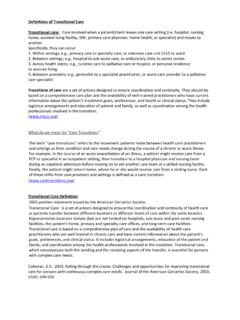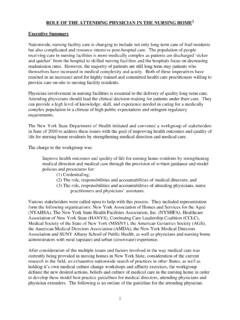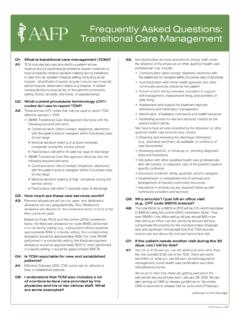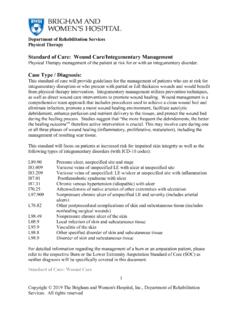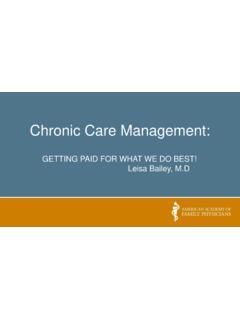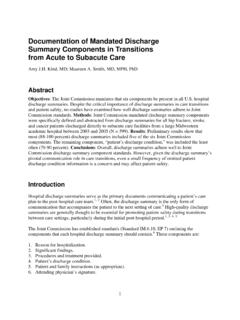Transcription of PSYCHOLOGICAL ISSUES RELATED TO INJURY IN …
1 PSYCHOLOGICAL ISSUES RELATED TO INJURY IN ATHLETES AND THE TEAM physician : A CONSENSUS STATEMENT This document provides an overview of selected medical ISSUES that are important to team physicians who are responsible for the care and treatment of athletes. It is not intended as a standard of care , and should not be interpreted as such. This document is only a guide, and as such, is of a general nature, consistent with the reasonable, objective practice of the healthcare profession. Adequate insurance should be in place to help protect the physician , the athlete, and the sponsoring organization. This statement was developed by a collaboration of six major professional associations concerned about clinical sports medicine ISSUES ; they have committed to forming an ongoing project-based alliance to bring together sports medicine organizations to best serve active people and athletes.
2 The organizations are: American Academy of Family Physicians, American Academy of Orthopaedic Surgeons, American College of Sports Medicine, American Medical Society for Sports Medicine, American Orthopaedic Society for Sports Medicine, and the American Osteopathic Academy of Sports Medicine. Expert Panel Stanley A. Herring MD, Chair, Seattle, Washington Lori A. Boyajian-O Neill DO, Kansas City, Missouri David B. Coppel PhD, Kirkland, Washington James M. Daniels MD, MPH, Quincy, Illinois Daniel Gould PhD, East Lansing, Michigan William Grana MD, MPH, Tucson, Arizona Eugene Hong MD, Philadelphia, Pennsylvania Peter Indelicato MD, Gainesville, Florida Rebecca Jaffe MD, Wilmington, Delaware Elizabeth Joy MD, Salt Lake City, Utah W.
3 Ben Kibler MD, Lexington, Kentucky Walter Lowe MD, Houston, Texas Margot Putukian MD, Princeton, New Jersey Definition Team physicians must address the physical and PSYCHOLOGICAL ISSUES RELATED to athletic activity. This athletic activity may result in physical injuries, and these injuries produce a variety of PSYCHOLOGICAL reactions. Additionally, PSYCHOLOGICAL factors, especially stress, are an important antecedent to injuries, play an important role in INJURY rehabilitation, and contribute to successful return-to-play. While non- INJURY PSYCHOLOGICAL ISSUES RELATED to athletic activity exist, they are outside the scope of this consensus statement. Goal The goal of this document is to help the team physician improve the care of the athlete by understanding the relationship between INJURY and the PSYCHOLOGICAL ISSUES RELATED to INJURY .
4 To accomplish this goal, the team physician should have knowledge of and be involved with: PSYCHOLOGICAL antecedents of athletic injuries PSYCHOLOGICAL ISSUES accompanying athletic INJURY PSYCHOLOGICAL ISSUES of athletic INJURY rehabilitation PSYCHOLOGICAL ISSUES and return-to-play Referring athletes to mental health providers PSYCHOLOGICAL Antecedents of Athletic Injuries PSYCHOLOGICAL factors ( , stressful life events) may contribute to the risk of athletic injuries above and beyond physical and environmental factors. Personality factors ( , introversion/extroversion, self esteem, perfectionism) and other PSYCHOLOGICAL factors ( , a supportive social network, coping resources, high achievement motivation) alone do not reliably predict athletic INJURY risk.
5 There is no INJURY -prone personality type. However, there has been a consistently demonstrated relationship between one PSYCHOLOGICAL factor stress and athletic INJURY risk. Stress may be defined as the demands of a situation exceeding the resources to respond to those demands (see Table 1). Athletes who experience high levels of stress, whether on or off the field, are at greater risk of being injured. Certain subpopulations of athletes, such as those experiencing high life stress and low personal coping skills, may be at an even greater risk of sustaining athletic INJURY . Stress causes attentional changes ( , narrowing of attention, general distraction, increased self-consciousness) that interfere with an athlete s performance.
6 Stress has been shown to cause increased muscle tension and coordination difficulties which increase the athlete s risk of INJURY . Teaching athletes stress management techniques has been shown to reduce INJURY rates over a season of participation. Table 1 SELECTED SIGNS AND SYMPTOMS OF STRESS Behavioral Physical PSYCHOLOGICAL Difficulty sleeping Lack of focus, overwhelmed Consistently performs better in practice/training than in competition Substance abuse Feeling ill Cold, clammy hands Profuse sweating Headaches Increased muscle tension Altered appetite Negative self-talk Uncontrollable intrusive and negative thoughts or images Inability to concentrate Self doubt It is essential the team physician : Recognize that PSYCHOLOGICAL factors may play a role as antecedents to sports injuries.
7 It is desirable the team physician : Promote monitoring by the athletic care network [see Sideline Preparedness for the Team physician , A Consensus Statement, 2000] of major life events and stressors ( , death in family, divorce, change in peer relationships, life transitions) which may place athletes at greater risk for INJURY . Develop strategies to address PSYCHOLOGICAL factors that may contribute to the risk of athletic injuries including: o Educating coaches and parents regarding the effects of attitudes and behaviors that equate INJURY with worthlessness ( , go hard or go home, no pain, no gain ) that may increase stress and consequently increase INJURY risk o Educating coaches and parents regarding excessive training and competition regimens in athletes o Addressing life stressors during preseason evaluations o Provision of PSYCHOLOGICAL support services, ( , stress management, counseling) as needed PSYCHOLOGICAL Reactions Accompanying Athletic INJURY Athletes can be expected to experience a variety of emotional responses and stress upon being injured.
8 They will attempt to interpret INJURY -relevant medical information, come to terms with being injured, and engage in coping responses. There is no predictable sequence of emotional reactions to athletic INJURY . For many athletes, exercise and physical activity serves as a primary coping mechanism and outlet for dealing with PSYCHOLOGICAL ISSUES . In these athletes, an INJURY may result in even greater emotional upheaval. Emotional responses to INJURY include sadness, feelings of isolation, irritation, lack of motivation, frustration, anger, alterations in appetite, sleep disturbance, and feeling disengaged. Problematic emotional reactions occur when symptoms do not resolve or worsen over time, or the severity of the symptoms seems excessive relative to other injured athletes (see Table 2).
9 Depression is an especially significant warning sign. It magnifies other emotional responses and impacts recovery from INJURY . Table 2 PROBLEMATIC EMOTIONAL REACTIONS (EXAMPLES) Persistent Symptoms Worsening Symptoms Excessive Symptoms Alterations of appetite Sleep disturbance Irritability Alterations of appetite into disordered eating Sadness into depression Lack of motivation into apathy Disengagement into alienation Pain behaviors Excessive anger or rage Frequent crying or emotional outbursts Substance abuse It is essential the team physician understand: Emotional reactions accompany athletic injuries.
10 These reactions may resolve or become problematic, thus impacting recovery from INJURY . It is desirable the team physician : Promote monitoring of emotional reactions by the athletic care network. Facilitate provision of PSYCHOLOGICAL support services as needed. Educate athletes, coaches and parents regarding emotional reactions to INJURY and recovery. Promote utilization of a supportive social network in INJURY recovery. PSYCHOLOGICAL ISSUES of Athletic INJURY Rehabilitation PSYCHOLOGICAL antecedents and emotional reactions play a key role in athletic INJURY rehabilitation. Injured athletes treated with a comprehensive rehabilitation program that includes addressing these ISSUES experience less stress.


